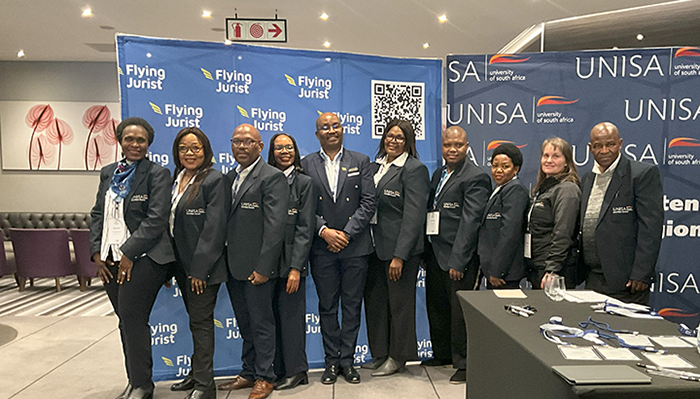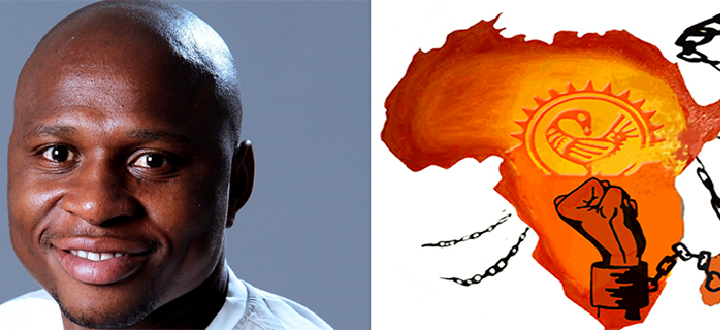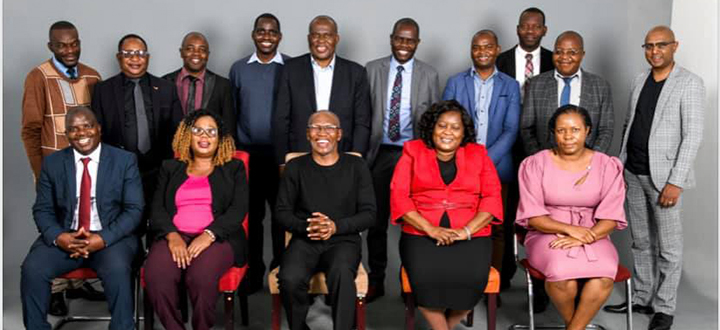

Prof Angelo Dube with the Unisa delegation
Unisa recently participated in Aviation Indaba 2025, hosted by Flying Jurist at the Maslow Hotel in Sandton.
Welcoming the guests, Prof Angelo Dube, Chief Executive Officer of Flying Jurist, said: "It is an immense honour to welcome you to the Aviation Indaba – a platform where ideas take flight and the future of aviation in South Africa and Africa is reimagined. Aviation is not merely about aircraft or infrastructure; it is about connecting people, enabling dreams and unlocking opportunities that uplift entire communities. It is about building bridges across borders and horizons."
He continued: "At Flying Jurist, we believe aviation must be more than an industry – it must be a movement for transformation, innovation and inclusion. Guided by the spirit of ubuntu, we envision a future where aviation is a powerful driver of economic justice, social progress and global competitiveness. Through mentorship, knowledge sharing and bold partnerships, we are shaping an ecosystem where young people, women and underrepresented voices are given wings to soar."
This indaba, he noted, is a call to action: a space to dream boldly, to collaborate fearlessly and to chart a course that ensures African aviation does not follow global trends but leads them. "Together, let us commit to building an aviation sector that is not only world-class but also deeply rooted in our values of humanity, resilience and shared prosperity. The skies are not the limit – they are our gateway to the future."
Flying Jurist, which explores the role of aviation in advancing law, policy and sustainable development, hosted a gathering of government leaders, industry stakeholders and traditional leaders. The indaba provides a platform to discuss challenges and to showcase the transformative role of aviation in driving South Africa’s economic growth, improving connectivity and supporting social development. Unisa, Ntsoane Attorneys Inc. and Advisory & Audit GMS generously sponsored tokens of appreciation for the guests.
Delivering the keynote address, the Honourable Lebogang Maile, MEC for Finance and Economic Development in Gauteng, emphasised that the aviation industry is not merely a means of transport but a powerful engine for sustainable development. He highlighted the strategic role of the Ekurhuleni Aerotropolis in driving economic growth through intermodal transport, positioning Gauteng as the heartbeat of Africa’s aviation hub. He noted that the aviation industry contributes over R24 billion to the economy annually, supports more than 46 000 jobs and stimulates a range of sectors, from hospitality to manufacturing. "The ripple effects of aviation-driven tourism are extensive," he said. "Local communities benefit from job creation and entrepreneurship, while government revenue is bolstered through tourism-related taxes and levies."
Maile pointed out that South Africa’s aviation sector also plays a critical role in facilitating trade across the African continent and beyond. Major airports, such as OR Tambo International and Cape Town International, are key cargo hubs for pharmaceuticals, electronics, and perishable agricultural exports. Reliable air freight is crucial for South African exporters competing on the global stage. Furthermore, aviation strengthens intra-African trade and supports the objectives of the African Continental Free Trade Area (AfCFTA), creating opportunities for deeper regional integration and economic resilience in the face of global uncertainties.
Beyond economics, aviation facilitates social development and inclusivity by connecting remote communities to essential services, including healthcare, disaster relief, and education. During the Covid-19 pandemic, the aviation sector played a crucial role in delivering vaccines and medical supplies across the continent. "Aviation bridges distance and geography, ensuring no community is left behind," Maile said. He also underscored the importance of skills development. Through partnerships between the government, airlines, and institutions such as the University of the Witwatersrand, South Africa continues to train world-class pilots, engineers and air traffic controllers.
Adding a cultural perspective, His Majesty Kgoshi Riba Phaswane III reminded delegates that development must be rooted in land, heritage and community empowerment. He called for inclusive investment in aviation and other industries, particularly in rural regions rich in natural resources but still burdened by poverty and unemployment. He further stressed the need for training-related partnerships in mining, tourism and aviation to unlock opportunities for young people. He emphasised that aviation should not only connect cities but also uplift historically disadvantaged communities by creating jobs, promoting tourism and opening access to education. "Let us ensure that aviation includes our grandparents, creates jobs for our youth, respects our environment and contributes to social cohesion," he said.
Government and traditional leaders agreed that aviation will remain central to South Africa’s vision of becoming a continental hub for trade, technology and sustainable growth. Strategic investment in infrastructure, human capital and green aviation technologies is critical for the sector’s future.
Concluding, Maile stated: "The aviation sector is far more than a means of transport; it is a vital engine of economic growth, social mobility and international engagement. By connecting people, goods and ideas, aviation shapes the fabric of our society and positions South Africa at the crossroads of a changing world."
* By Nontobeko Primrose Qumbisa, Communication and Marketing Intern, Gauteng Region
Publish date: 2025/10/08
 Unisa empowers award-winning agro-cosmetics entrepreneur
Unisa empowers award-winning agro-cosmetics entrepreneur
 Unisa celebrates a project of hope, dignity and student success
Unisa celebrates a project of hope, dignity and student success
 Women vocalists take top honours at Unisa's globally renowned showcase
Women vocalists take top honours at Unisa's globally renowned showcase
 African wealth is dependent on investment in education and development
African wealth is dependent on investment in education and development
 Unisa celebrates matric result success at Correctional Services ceremony
Unisa celebrates matric result success at Correctional Services ceremony